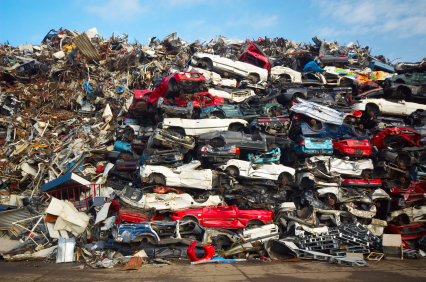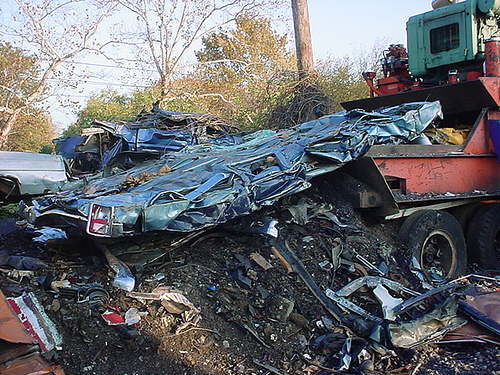
scrap heap
Well, no, actually the government is not going to seize and crush your old car.
But you might never know it from the shrieking that arises every time the notion of a "Cash for Clunkers" buyback scheme is proposed at some level of government.
The latest round comes from a new proposal, the Consumer Assistance to Recycle and Save bill--or CARS Act [moan]--introduced by Representative Betty Sutton (D-Ohio). Her bill marks the third attempt to get Congress to approve such a program.
It's a simple idea: Offer money to any car owner who replaces an old, high-polluting vehicle with a new, low-emission / high-mileage car. It removes a lot of emissions quickly from "gross polluters" (cars with primitive emissions systems built before the mid-1990s), and it's also a way to boost new-car sales.
In fact, in Germany, new-car sales rose 21 percent under such a program, and now Great Britain and China are considering their own programs.
Sutton's CARS Act is roughly similar to earlier proposals. It offers a $5,000 voucher to buyers of cars assembled in North America ($4,000 otherwise) who trade in a car at least 8 years old.
The scrapped vehicle has to be replaced with one that's more fuel-efficient: a truck that gets at least 24 mpg on the highway, or a car that gets 27 mpg. Alternatively, the credit can be turned into a $3,000 mass-transit voucher.
The cars eligible for these programs have to be registered and roadworthy; you can't haul in a junkyard carcass to get your bounty.
Nonetheless, it appears that some car collectors envision SWAT teams breaking into your garage, seizing your priceless restored collector car, and tearing it into shards of useless metal, right there on your front lawn.
Phrases like "nightmare," "evil," and "slippery slope" are often tossed around with abandon. Here, for instance, about an expansion of California's current program. So, let's review.
First, these are voluntary programs. You can keep driving your high-polluting vehicle as long as you like, assuming it passes annual inspections in states that have them.
Second, opponents often suggest it's a better use of money to repair old cars than to junk them. But that depends what your goal is. If you want to reduce emissions, remember that 20 years ago, cars legally put out 10 times the emissions of today's new cars. Repairing a highly-polluting car to make it slightly less highly-polluting doesn't go very far.
Third, the bills require the cars to be crushed, scrapped, dismantled, or otherwise made useless. Some complain that this deprives collectors of spare parts. That may be true, but what gets turned in is often pretty beat. We're not talking one-owner Hemi 'Cudas here, folks.
Finally, the major lobbying effort against these bills comes from groups like the Automotive Service Assocation and the Specialty Equipment Market Association (SEMA), whose business is repairing and selling parts for existing cars. Understandly, they have a vested interest in keeping as many old cars on the road as possible.
In the end, we hope the rhetoric (like the absurd headline on this story) can be toned down, and the two opposing views can agree on a few points. For instance, automotive emissions should be minimized in as many ways as possible; government policy relating to autos should be assessed for cost-effectiveness; and carrots are preferable to sticks.
Can't we all just get along here?

Car Crusher by Flickr user wilkesjournal
[SOURCES: Automotive News (subscription required); car crusher photo by Flickr user wilkesjournal.]













